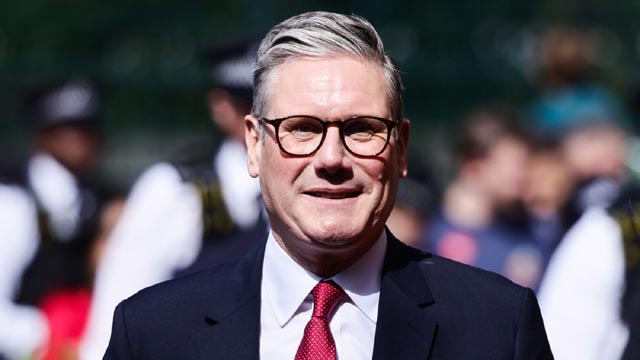
LONDON, July 5, 2024 (BSS/AFP) - Britain's main opposition Labour party looks set for a landslide election win, exit polls indicated on Thursday, with Keir Starmer replacing Rishi Sunak as prime minister, ending 14 years of Conservative rule.
The survey for UK broadcasters suggested centre-left Labour would win 410 seats in the 650-seat House of Commons, putting it back in power for the first time since 2010, with a 170-seat majority.
Sunak's Tories would only get 131 -- a record low -- with the right-wing vote apparently spliced by Nigel Farage's anti-immigration Reform UK party, which could bag 13 seats.
In another boost for the centrists, the smaller opposition Liberal Democrats would get 61 seats, ousting the Scottish National Party on 10 as the third biggest party.
The projected overall result bucks a rightward trend among Britain's closest Western allies, with the far-right in France eyeing power and Donald Trump looking set for a return in the United States.
British newspapers all focused on Labour's impending return to power for the first time since the days of Gordon Brown in 2010.
"Keir We Go," headlined the Labour-supporting Daily Mirror. "Britain sees red," said The Sun, the influential Rupert Murdoch tabloid which swung behind Labour for the first time since 2005.
Both Starmer and Sunak thanked activists for their work and support during the election campaign but senior Labour figures refrained from any premature celebrations.
- 'Brighter future' -
Counting of ballots from some 40,000 polling stations across the country stretches into the night, with official results expected into Friday morning.
The first to declare, just over an hour after polls closed at 2100 GMT, was Houghton and Sunderland South, in northeast England, where Labour's Bridget Phillipson was returned as MP.
Phillipson, certain to become education secretary, said Britons seemed to have chosen a "brighter future".
"After 14 years the British people have voted change... Labour will honour the trust that you have placed in us," she told supporters to applause.
Under Britain's first-past-the-post electoral system, a party needs 326 seats to win an overall majority in parliament.
The leader of the winning party is expected to meet head of state King Charles III on Friday morning, who will ask the leader of the largest party to form a government.
Ministerial appointments will follow soon after an acceptance speech in Downing Street.
The Tories worst previous election result is 156 seats in 1906, and former leader William Hague told Times Radio the projections would be "a catastrophic result in historic terms".
But Tim Bale, politics professor at Queen Mary, University of London, said it was "not as catastrophic as some were predicting" and the Tories would now need to decide how best to fight back.
Farage, aiming to become an MP at the eighth time of asking, has made no secret of his aim to take over the Tories and claimed Reform's results were proof that "the revolt against the establishment is underway".
- To-do list -
Labour's resurgence is a stunning turnaround from five years ago, when hard-left former leader Jeremy Corbyn took the party to its worst defeat since 1935 in an election dominated by Brexit.
Starmer, 61, took over in early 2020, and set about moving the party back to the centre, making it a more electable proposition and purging infighting and anti-Semitism that lost it support.
Opinion polls have put Labour consistently 20 points ahead of the Tories for almost the past two years, giving an air of inevitability about a Labour win -- the first since Tony Blair in 2005.
Starmer -- the working-class son of a toolmaker and a nurse -- has promised "a decade of national renewal" after post-financial crash austerity measures, Brexit upheaval and a cost-of-living crisis.
But his to-do list is daunting, with economic growth anaemic, public services overstretched and underfunded due to nearly a decade-and-a-half of swingeing cuts, and households squeezed financially.
The Labour leader has also promised a return of political integrity, after a chaotic period of five Tory prime ministers, including three in four months, scandal and sleaze.
"I know that the road ahead will not be easy. There are no quick fixes, and hard choices lie ahead," Labour's likely finance minister, Rachel Reeves, said after being re-elected.
"We are under no illusions about the scale of the challenge that we face, or about the severity of the challenges that we will inherit from the Conservatives."